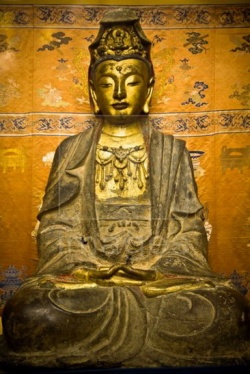Lokeśvararāja
Lokeśvararāja; ("World Sovereign King"
The Legend of the Buddha Lokeśvararāja and the bhikṣu Dharmākara
“Although the Buddha Lokeśvararāja guided the bhikṣu Dharmākara in the ten directions to contemplate the pure universes, the qualities (guṇa) and the power (bala) of this bhikṣu were too weak and he was unable to see the supremely pure universes”.
“The Buddha Che tseu tsai wang (Lokeśvararāja) led the bhikṣu Fa tsi (Dharmākara) in the ten directions and showed him the pure universes.”
This bhikṣu is none other than the future Buddha Amitābha whose births are told in the Sukhāvatīvyūha (ed. M. Müller and B. Nanjio in Anecdota Oxoniensis, vol. I, part II, Oxford, 1883; tr. M. Müller, Buddhist Mahāyāna Sūtras, SBE, vol. 49, part II) and its six Chinese translations (T 360, 361, 362, 363, 364, 310[5]).
The Hôbôgirin, Amida, p. 26, summarizes this work as follows:
At the time of the Buddha Lokeśvara, the 53rd Buddha after Dīpaṃkara, a king had the thought of enlightenment from having heard the sermons of this Buddha. He abandoned his throne and became a monk under the name of Dharmākara. Upon the prayer of this monk, the Buddha Lokeśvararāja showed him the good and the evil of gods and men and the merits and demerits of the different realms of the 210 million Buddha realms which he showed him.
The monk spent five kalpas reflecting in order make a choice and to acquire the pure practices with which one can adorn a Buddha realm; then he went again to the same Buddha and pronounced the 48 vows, the main one of which is the 18th, formulated by T 360 as follows:
“Supposing that I succeed in becoming Buddha, if beings of the ten directions, believing in me and loving me wholeheartedly, make the wish to be reborn in my realm to the extent of ten thoughts, if they are not reborn there, may I not receive supreme perfect enlightenment, except only for those guilty of the five sins of immediate retribution and slander against the holy Dharma.”
In the Sanskrit text, this vow is the 19th and is formulated in v. 8, no. 10 as follows: Sa can me bhagavān bodhiprāptasyāprameyāsaṃkhyeyeṣu buddhakṣetreṣu … samyaksaṃbodhim abhisaṃbuddheyam. Then he accumulated the practices so that his vows were realized and he became the perfect Buddha Amitāyus in his western paradise where he he has already reigned for ten kalpas.
